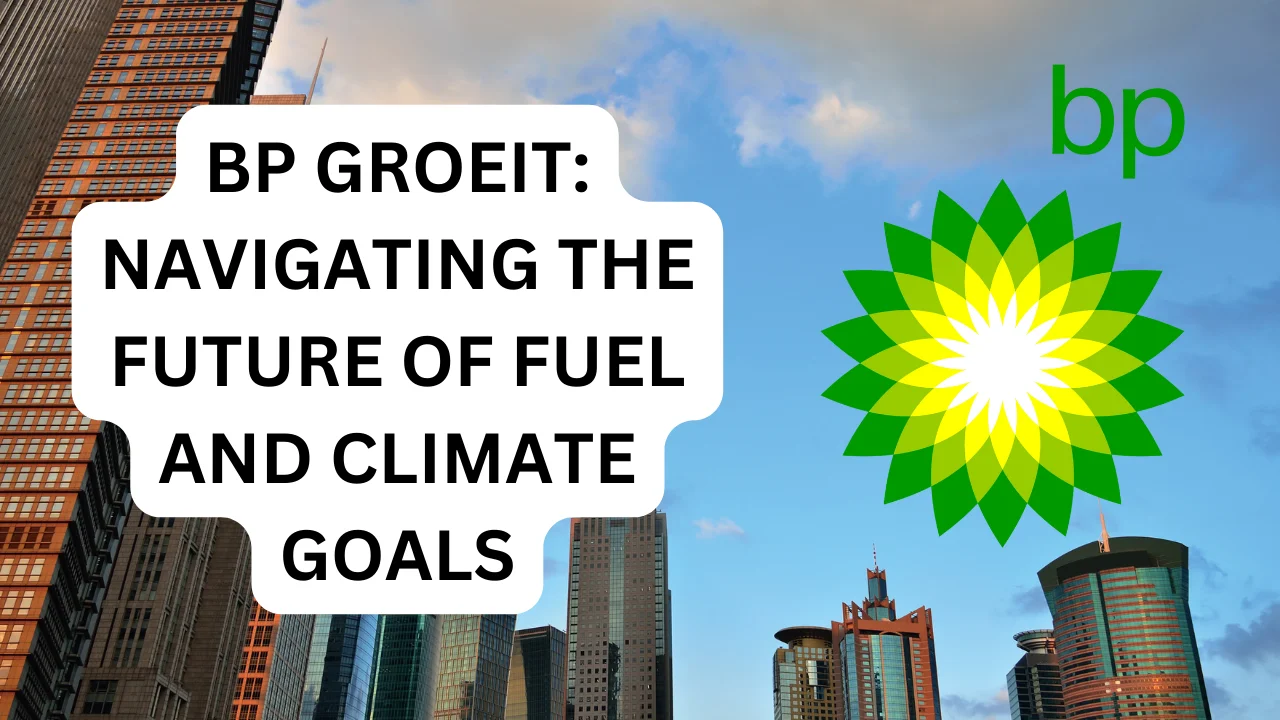BP Groeit, Benzine, Climate Goals, Brandstof

BP, one of the world’s leading oil and gas companies, is experiencing significant growth as it navigates the complex landscape of fuel production and climate goals. As the world grapples with the dual challenges of meeting energy demands and reducing carbon emissions, BP Groeit strategi and innovations are crucial in shaping a sustainable future. This article explores BP Groeit, its role in traditional and renewable energy sectors, and the impact of its climate initiatives on the global energy market.
BP’s Growth Trajectory
BP, originally known as the Anglo-Persian Oil Company, has a long and storied history in the oil and gas industry. Over the years, BP has grown from a regional player to a global energy giant, expanding its operations and refining capabilities across multiple continents. Recently, BP has focused on diversifying its energy portfolio, investing heavily in renewable energy sources while maintaining its core business in traditional fuels.
Also Read:- Slope Unblocked Games 76 | Gamerxyt.com Categories | Titfees The Rise of Remote Work
The Role of Traditional Fuels
Despite the global push towards renewable energy, traditional fuels like gasoline (benzine) remain a significant part of BP’s business. Gasoline continues to be in high demand, especially in regions where electric vehicle infrastructure is still developing. BP’s extensive network of refineries and distribution channels ensures a steady supply of gasoline to meet current market demands.
Transition to Sustainable Energy
In line with global climate goals, BP has committed to transitioning towards more sustainable energy sources. This includes substantial investments in wind, solar, and biofuels. BP aims to reduce its carbon footprint and support the global shift towards a low-carbon economy. These efforts are part of BP’s broader strategy to become a net-zero company by 2050.
Challenges in the Transition
Balancing the production of traditional fuels with the development of renewable energy presents several challenges. Economically, BP must manage the costs associated with investing in new technologies while maintaining profitability in its conventional operations. Technologically, there are hurdles in scaling up renewable energy solutions to meet global energy demands.
Innovations in Fuel Technology
BP is at the forefront of fuel technology innovation, exploring cleaner and more efficient ways to produce energy. Advances in biofuels and synthetic fuels offer promising alternatives to traditional gasoline, with the potential to significantly reduce carbon emissions. BP’s research and development efforts are crucial in driving these innovations forward.
Strategic Partnerships and Collaborations
To accelerate its transition to sustainable energy, BP has formed strategic partnerships with other energy companies and tech firms. These collaborations are essential for sharing knowledge, resources, and technologies. Joint ventures in areas such as electric vehicle infrastructure and renewable energy projects highlight BP’s commitment to a collaborative approach in achieving sustainability.
Government Regulations and Policies
Global climate policies and environmental regulations have a profound impact on BP’s operations. Compliance with these regulations is not only mandatory but also essential for maintaining BP’s reputation and market position. BP actively engages with policymakers to shape regulations that support sustainable energy development while ensuring economic viability.
BP’s Climate Goals
BP has set ambitious climate goals, including a significant reduction in carbon emissions by 2030 and achieving net-zero emissions by 2050. These targets involve a comprehensive strategy encompassing operational efficiency, investment in renewables, and innovations in energy technology. BP regularly reports its progress, demonstrating transparency and accountability.
Must Read:- Discover the Delicious Flavors of calvé, calvé proef, andrelon | Randy Dee Hafen: Net Worth, Early Life, Career Path and More
Impact on Consumers
BP’s transition to sustainable energy has direct implications for consumers. As BP invests in cleaner energy sources, consumers can expect more options at the pump, including biofuels and other alternative fuels. Additionally, the shift towards renewable energy may influence fuel prices, with potential long-term benefits for consumers as renewable technologies become more cost-effective.
Economic Implications
BP’s commitment to sustainable energy has significant economic implications. Investments in renewable energy create jobs and stimulate economic growth in related industries. Furthermore, reducing reliance on fossil fuels can mitigate the economic risks associated with volatile oil markets and geopolitical tensions.
Conclusion on BP Groeit
BP’s journey of growth and commitment to climate goals highlights the complex but essential path towards a sustainable energy future. By balancing traditional fuel production with investments in renewable energy, BP is not only meeting current energy demands but also paving the way for a greener tomorrow. As consumers, stakeholders, and policymakers, our support and engagement with these efforts are crucial in achieving a sustainable and prosperous future.
FAQ’s:-
1. What is BP’s plan for reducing carbon emissions?
BP aims to reduce its carbon emissions by 30-35% by 2030 and achieve net-zero emissions by 2050 through a combination of operational efficiencies, investments in renewable energy, and innovations in fuel technology.
2. How does BP balance traditional and renewable energy sources?
BP balances traditional and renewable energy sources by continuing to produce gasoline to meet current demand while investing heavily in renewable energy projects like wind, solar, and biofuels to transition towards a sustainable future.
3. What innovations is BP pursuing in fuel technology?
BP is exploring advances in biofuels, synthetic fuels, and other cleaner fuel technologies to reduce carbon emissions and provide sustainable energy alternatives to traditional fossil fuels.
4. How do BP’s climate goals affect consumers?
BP’s climate goals offer consumers more fuel options, including biofuels and other alternative fuels, potentially leading to more stable and possibly lower fuel prices in the long term as renewable technologies become more cost-effective.
5. What are the economic implications of BP’s energy transition?
BP’s transition to sustainable energy can create jobs, stimulate economic growth in related industries, and reduce economic risks associated with volatile oil markets, contributing to a more stable and sustainable global economy.


